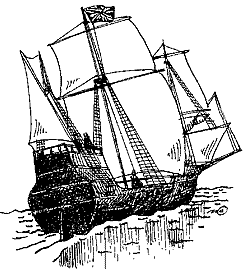Fifth Grade - Social Studies
Activities
Career Tree
Financial and Economic Concepts: Careers Fifth Grade – Social Studies
Fifth Grade – Social Studies
Standard 1: Students will understand how the exploration and colonization of North America transformed human history.
Objective 1: Describe and explain the growth and development of the early American colonies.
Objective 2: Assess the global impact of cultural and economic diffusion as a result of colonization.
Objective 3: Distinguish between the rights and responsibilities held by different groups of people during the colonial period.

Materials: Career Tree Worksheet, writing materials
Time: 20-30 Minutes
For this activity, students design a "career tree" based on the occupations of the people in their family.
Design a “career tree” based on the occupations of your family members. Place yourself, brothers, and sisters in the base along with the occupation you/they are interested in or have already chosen. Go back as many generations as you can.
When students have completed the worksheet, have them write each occupation/career on the back of the paper and write 2-3 sentences next to each explain why they would or would not choose that career.
![]() Career Tree Worksheet (pdf)
Career Tree Worksheet (pdf)
No Extra Room on the Mayflower
Financial and Economic Concepts: Scarcity and Choices Fifth Grade – Social Studies
Fifth Grade – Social Studies
Standard 1: Students will understand how the exploration and colonization of North America transformed human history.
Objective 1: Describe and explain the growth and development of the early American colonies.
Compare the geographic and cultural differences between the New England, Middle, and Southern colonies (e.g., religious, economic, political).

Materials: Computer (for each student, or 1 as a class), projector (if using 1 computer)
Time: 45-60 Minutes
Instruct students to picture themselves as English Pilgrims in 1617. They are a people persecuted for their religious beliefs. Tell students to imagine that their families have just gained passage on a ship called the Mayflower, bound for America. They will need to start packing for the long voyage, but they must keep in mind that the Mayflower is not a large ship, and there will be 101 other people on the ship. Tell them to pack only the important items.
To help students gain background knowledge about the Pilgrims and the Mayflower, have them explore the following Web site:
*For the youngest students, teachers guide the exploration of this site and help with the task of reading it.
This site will take the students step by step through the Mayflower. There are 10 different parts of the ship to explore. Each section of the ship is described in kid-friendly language and with a picture. Section eight describes the area the Pilgrims lived in for the entire voyage.
After visiting the site, lead the class in a discussion of life on the Mayflower. Ask the students if they think they would have liked living on the Mayflower. Talk with them about how little space the Pilgrims had to live in. Explain that the limited space is an example of scarcity. Scarcity is not having all the goods and services people want. In this case, the people on the Mayflower did not have all the space they wanted.
Suggestion: Conduct a brainstorming session in which the task is to list things the Pilgrims would need in the new land. Ask the students if they have ever packed a suitcase to stay for an overnight visit. Explain that, as they imagine themselves in the role of Pilgrims, they will have limited space in their suitcases, just like the Pilgrims had limited space. Below are some questions that can be used in discussion after the students have toured the Mayflower.
- What would the trip have been like?
- What would you have missed the most?
- Why didn't the Pilgrims bring everything they wanted with them?
- How does the idea of scarcity help to explain why we can't always get what we want? What was scarce on the Mayflower?
Popcorn Economics
Financial and Economic Concepts: Economic Reasoning/Scarcity and Choices Fifth Grade – Social Studies
Fifth Grade – Social Studies
Standard 4: Students will understand that the 19th century was a time of incredible change for the United States, including geographic expansion, constitutional crisis, and economic growth.
Objective 3: Evaluate the course of events of the Civil War and its impact both immediate and long-term.
Objective 4: Understand the impact of major economic forces at work in the post-Civil War.
Evaluate the roles new immigrants played in the economy of this time.

Materials: popped popcorn in a brown grocery bag (staple bag closed), brown grocery bags stuffed with crumpled newspaper (stapled closed), brown paper lunch bags (several per student), alternative snack such as dry cereal
Time: 40-45 Minutes
In this lesson, students experience scarcity through an activity. Following the activity, students relate the concept of scarcity to situations in school and their community. Students learn that people make choices because of scarcity.
![]() Complete Lesson Plan and Discussion Questions
Complete Lesson Plan and Discussion Questions
The South's Decision to Secede
Financial and Economic Concepts: Economic Reasoning Fifth Grade – Social Studies
Fifth Grade – Social Studies
Standard 4: Students will understand that the 19th century was a time of incredible change for the United States, including geographic expansion, constitutional crisis, and economic growth.
Objective 2: Assess the geographic, cultural, political, and economic divisions between regions that contributed to the Civil War.
Objective 3: Evaluate the course of events of the Civil War and its impact both immediate and long-term.

Materials: Civil War visuals, websites, handouts, and quiz available through lesson plan – use as needed.
Time: 20-30 Minutes; can be up to a multiple day lesson/project if all components of lesson are followed.
Your students will consider the following questions:
- In deciding to secede from the Union in 1861, did the South violate its own self-interest and thus disprove the basic economic principle that people seek to further their self-interest in the decisions they make?
To get at the question, each student will assume the role of an ardent secessionist. Acting in this role, the students will apply principles of economic reasoning and use a decision grid to weigh the benefits and costs of the South's effort to create a new nation in which slavery and state's rights would forever be guaranteed by law.
![]() Complete Lesson Plan - including visuals, worksheets, assessments, etc.
Complete Lesson Plan - including visuals, worksheets, assessments, etc.
Start From Scratch
Financial and Economic Concepts: Online Commerce Fifth Grade – Social Studies
Fifth Grade – Social Studies
Standard 4: Students will understand that the 19th century was a time of incredible change for the United States, including geographic expansion, constitutional crisis, and economic growth.
Objective 4: Understand the impact of major economic forces at work in the post-Civil War.
Evaluate the roles new immigrants played in the economy of this time
 Materials: writing utensil, paper
Materials: writing utensil, paper
Time: 20-30 Minutes
Ask students to pretend that they are a member of a family which, due to a disaster, has lost all of their belongings except the clothes they are wearing.
Working individually or in small groups, students should "shop" online for 10-15 items which they will need or want to reestablish their lives.
Students should list the items they would choose to purchase and then discuss their choices.
Suggested questions for class discussion:
- What must we have in order to exist?
- What are some items which are not necessary to make life more comfortable?
- Which of the things you picked out to purchase are necessary to exist?
- How would people acquire these items in the 1950s?
- What things have influenced how we acquire what we need? (Internet, postal service, downloads, computers)
Next to each item on the list, have students explain why they would need or want that item and how it would influence their life.
Safe Online Shopping
Financial and Economic Concepts: Online Commerce Fifth Grade – Social Studies
Fifth Grade – Social Studies
Standard 5: Students will address the causes, consequences and implication of the emergence of the United States as a world power.
Objective 3: Evaluate the role of the United States as a world power.

After viewing the video, discuss with your class how online commerce has influenced the United States as a world power.


